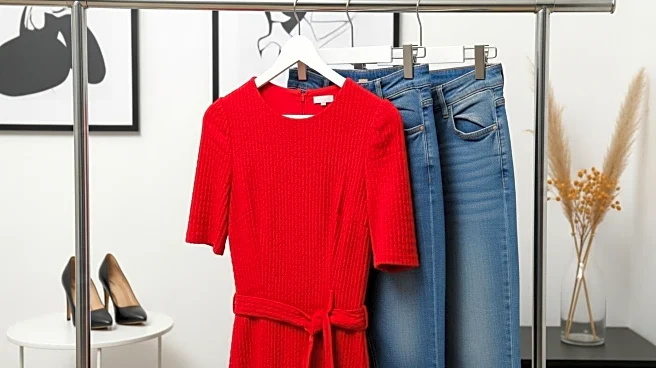What's Happening?
US shoppers are experiencing significant price hikes on fast fashion brands such as Zara, Mango, and River Island due to tariffs imposed by President Trump. These tariffs, set at 10% for the UK and 15% for the EU, are contributing to the increased costs of imported goods. For example, a Mango jacket priced at 299.99 Euros in Spain, equivalent to $351, costs $649.99 in the US, marking an 85% increase. Similarly, a River Island trench coat priced at 110 pounds in the UK, equivalent to $147, costs $247 in the US, a 68% increase. These discrepancies have led to frustration among American consumers, who are noticing the stark differences in pricing compared to European stores.
Why It's Important?
The price hikes on fast fashion brands in the US highlight the broader impact of tariffs on consumer goods. These increases may lead to a shift in consumer behavior, with shoppers potentially opting for US-made products or seeking alternatives to avoid higher costs. Retailers may be adjusting prices beyond the actual tariff costs to offset potential losses in market share and meet investor expectations. This situation underscores the complex dynamics of international trade and its direct effects on consumer pricing, potentially influencing shopping habits and retail strategies in the US market.
What's Next?
As US consumers continue to face higher prices, some may consider shopping trips to Europe to take advantage of lower costs abroad. Retailers might explore strategies to mitigate the impact of tariffs, such as shifting production away from high-tariff countries or increasing automation to reduce operational costs. The ongoing price discrepancies could prompt further discussions on trade policies and their implications for both consumers and businesses. Additionally, brands may need to reassess their pricing strategies to maintain customer loyalty and competitiveness in the US market.
Beyond the Headlines
The situation raises questions about the ethical implications of pricing strategies and the balance between profit margins and consumer fairness. Retailers may face scrutiny over their pricing decisions, especially if perceived as exploiting tariff situations for excessive profit. This development could also influence cultural perceptions of fast fashion brands and their commitment to providing affordable options. Long-term, the impact of tariffs on consumer goods may drive innovation in retail practices and encourage more sustainable and cost-effective production methods.










